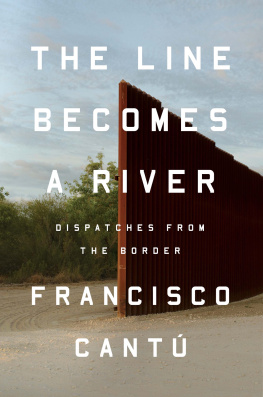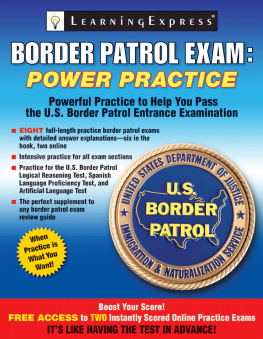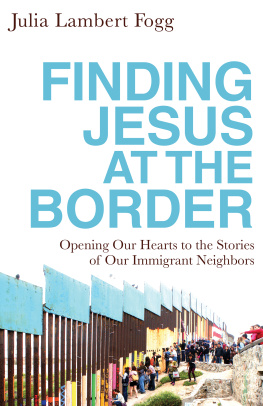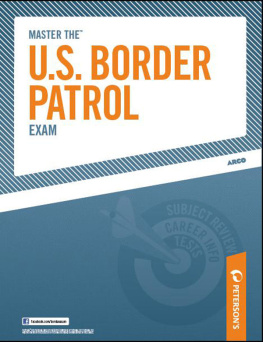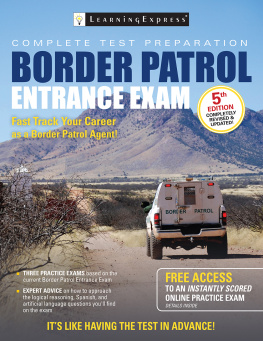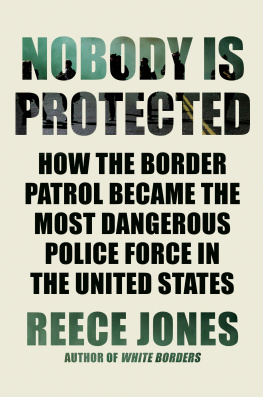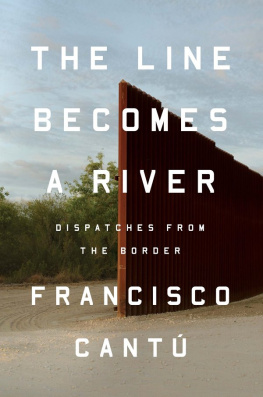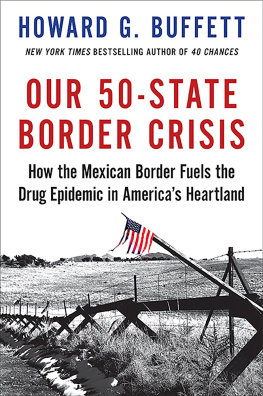
RIVERHEAD BOOKS
An imprint of Penguin Random House LLC
375 Hudson Street
New York, New York 10014

Copyright 2018 by Francisco Cant
Penguin supports copyright. Copyright fuels creativity, encourages diverse voices, promotes free speech, and creates a vibrant culture. Thank you for buying an authorized edition of this book and for complying with copyright laws by not reproducing, scanning, or distributing any part of it in any form without permission. You are supporting writers and allowing Penguin to continue to publish books for every reader.
Some of the material in this book originally appeared, in different form, in Edible Baja Arizona, Guernica, Orion, Ploughshares, J Journal: New Writing on Justice, and South Loop Review.
Grateful acknowledgment is made to Les Figues Press for permission to quote from Antgona Gonzlez by Sara Uribe and to Cristina Rivera Garza and her translator, Jen Hofer, for providing preliminary excerpts from the forthcoming English translation of Dolerse.
Library of Congress Cataloging-in-Publication Data
Names: Cant, Francisco, author.
Title: The line becomes a river : dispatches from the border / Francisco Cant.
Description: New York : Riverhead Books, 2018.
Identifiers: LCCN 2017014247 (print) | LCCN 2017042308 (ebook) | ISBN 9780735217720 (ebook) | ISBN 9780735217713 (hardback)
Subjects: LCSH: Cant, Francisco (Essayist) | Mexican-American Border RegionEmigration and immigration. | Illegal aliensMexican-American Border Region. | Border securitySocial aspectsMexican-American Border Region. | U.S. Border PatrolOfficials and employeesBiography. | BISAC: BIOGRAPHY & AUTOBIOGRAPHY / Cultural Heritage. | BIOGRAPHY & AUTOBIOGRAPHY / Personal Memoirs.
Classification: LCC JV6565 (ebook) | LCC JV6565 .C37 2018 (print) | DDC 363.28/5092 [B]dc23
LC record available at https://lccn.loc.gov/2017014247
p. cm.
This book is a work of memoir; it is a true story based on the authors best recollections of various events in his life. The names and identifying characteristics of certain people mentioned in the book have been changed in order to protect their privacy. In some instances, the author has combined minor characters and rearranged and/or compressed events and time periods in service to the narrative, and dialogue has been re-created to match the authors best recollection of those exchanges.
Version_1
To my mother and grandfather, for giving me life and a name; and to all those who risk their souls to traverse or patrol an unnatural divide
PROLOGUE
My mother and I drove east across the flatlands, along the vast floor of an ancient sea. We had come to West Texas to spend Thanksgiving in the national park where my mother worked as a ranger during the years when I formed my first childhood memoriesimages of wooded canyons and stone mountains rising up from the earth, the sound of wind whipping across low desert hills, the warmth of the sun beating down upon endless scrublands.
As we neared the Guadalupe Mountains we passed an expanse of salt flats and I asked my mother to stop the car. She pulled onto the shoulder and we walked out together across broken earth. We stood looking north toward the Guadalupes, towering remnants of a Permian reef once submerged beneath the inland waters of Pangaea. A cool November wind blew against our bodies like a slow current of water and I bent down to touch the ground, breaking off a piece of white crust and rubbing it between my fingers. I touched my tongue and looked up at my mother. It tastes like salt, I told her.
Inside the park, my mother and I waited at the visitor center while a uniformed woman stood at the reception desk with a pair of visitors, patiently explaining the parks camping fees and hiking options. When the visitors turned to walk away, the woman caught sight of us and a smile spread across her face. She hurried over from behind the desk and reached out to hug my mother before taking a step back to look at me. She stood for a moment in disbelief. Ay mijo, the last time I saw you, you were barely this tall. She held her hand down at her knees. Are you still in Arizona? she asked us. Mom is, I said, but I went away for college in Washington. Her eyes grew wide. The capital? I nodded. Qu impresionante. And what are you studying? International relations, I told her. Hes studying the border, my mother added. Were staying in El Paso on our way back so he can visit Ciudad Jurez.
The woman shook her head. You better be careful, she said, Jurez is dangerous. She stared at me with her hands on her hips and then reached out to touch my shoulder. You know, I still remember babysitting you when you were a little chamaquito. She looked down at my shoes. All you wanted back then was to be a cowboy. You would wear those little cowboy boots and that little cowboy hat and run around with my boys in the backyard, chasing each other with those little plastic guns. My mother grinned. I remember it too, she said.
The next morning, my mother and I woke early to hike through a canyon that stretched upward into the wooded backside of the Guadalupes. As we walked, my mother became a guide again, pointing at the quivering yellow leaves of a bigtooth maple, reaching out to touch the smooth red bark of a madrone tree. She bent down and plucked the dried shell of a dragonfly larva from a blade of grass and slowly turned it in her dirt-smudged hands. She looked up the trail toward the slow-rolling waters of the stream and began to speak to me of the glistening arthropod, explaining how it would have sloughed its skin to flit upon the swirling winds of the canyon. She cradled its exoskeleton in her hands like a sacred object. Dragonflies migrate as birds do, she told me, beating their papery wings for days on end across rolling plains, across long mountain chains, across the open sea.
My mother left the trail and sat on a rock at the edge of the stream, removing her shoes and socks. She rolled her pants to the base of her knees and waded into the water, tensing her shoulders at its coolness. She invited me to join her, but I shook my head and sat alone in the dappled sunlight on the bank. My mother stepped over rocks and fallen branches, pointing at the way the water flowed over an exposed root, the way the sun shone brightly on a clump of green grass. She bent over and touched the surface of the water, rubbing her wet hands on her face. As I collected fallen maple leaves, my mother reached down and pulled a handful of pebbled limestone from the streambed. Come, she called to me with dripping hands. Touch the water.
That night, as we sat in a backcountry research station eating precooked turkey and instant stuffing, I asked my mother why she had joined the Park Service all those years ago. She stabbed her fork at a piece of stuffing. I joined because I wanted to be outdoors, she told me, because the wildlands were a place where I could understand myself. I hoped that as a park ranger I could awaken peoples love for nature, that I could help foster their concern for the environment. She glanced up from her plate. I wanted to guard the landscape against ruin, she said, to protect the places I loved. I sat back in my chair. And how does it feel now, I asked, looking back on it? My mother set down her fork and ran her finger along the wood grain at the edge of the table. I dont know yet, she said.

